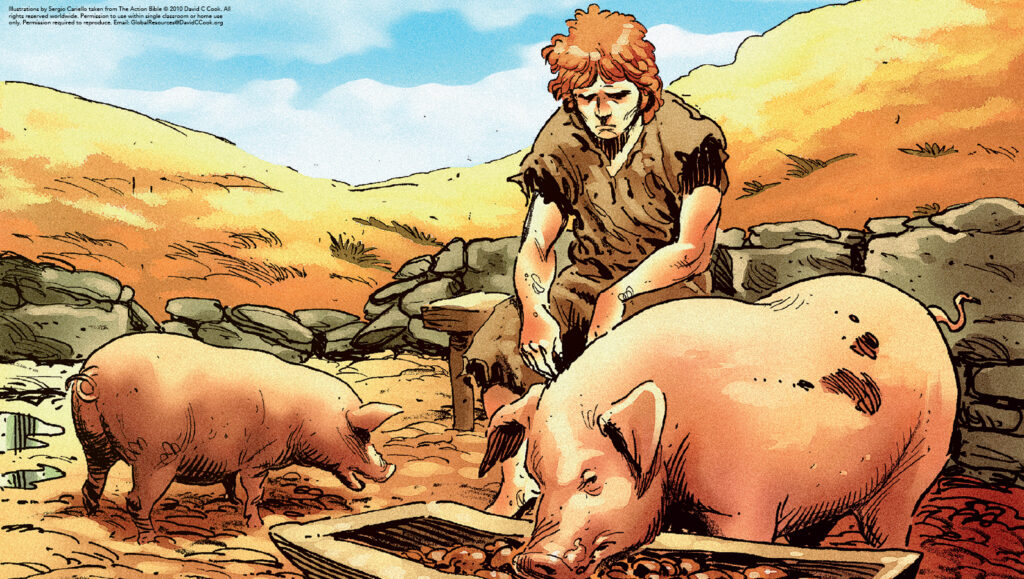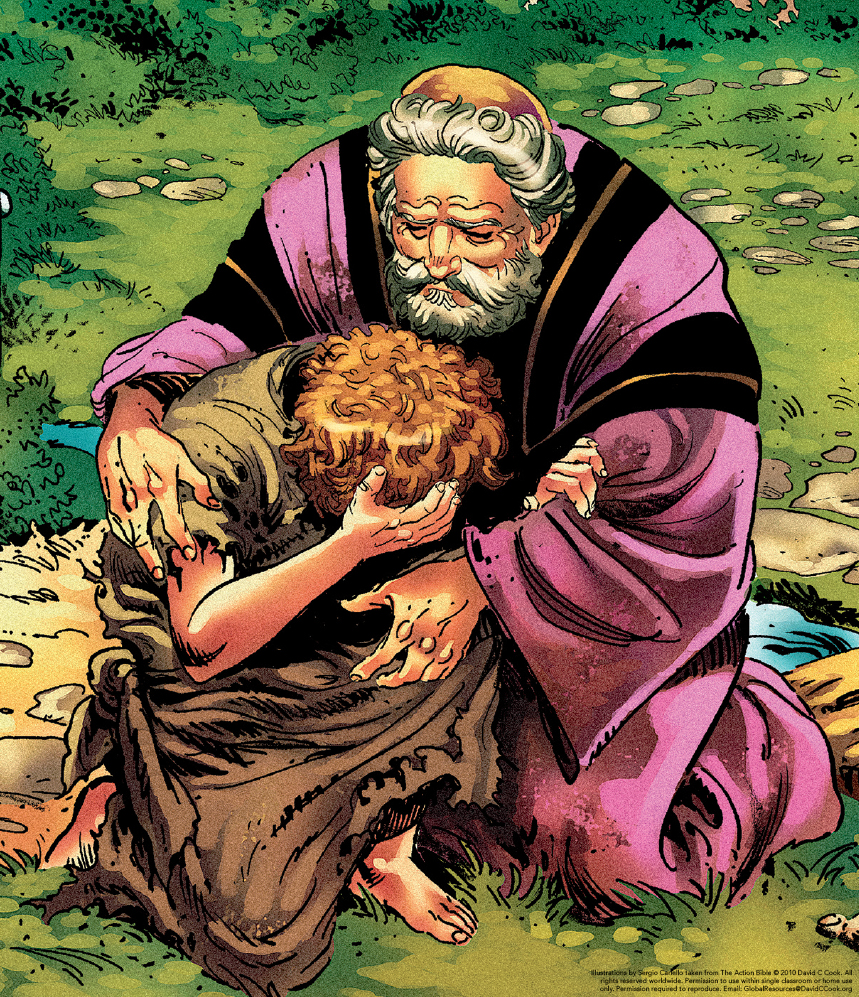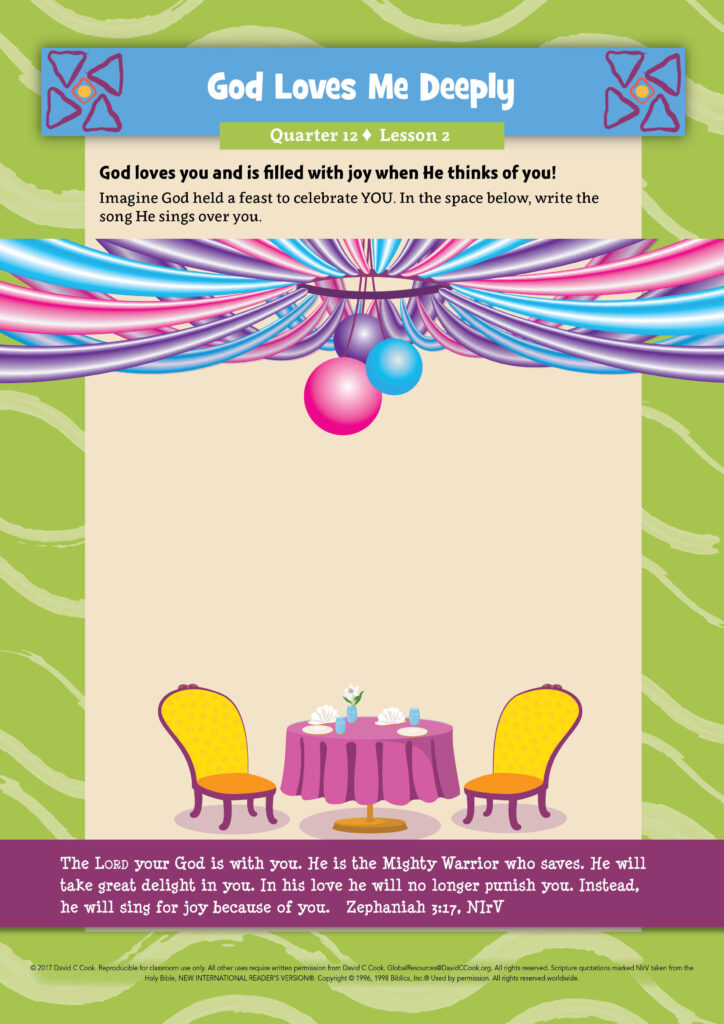During the lesson, the information for you to know is written in regular type, and what we suggest speaking or reading aloud to children is in bold. All resources for this lesson, including the Teacher Guide, Student Page, Family Connection Card, and other resources can be downloaded in a ZIP file by clicking on the following link:
In some lessons you will find "resource articles." These are articles written by experts from around the world to help equip you for your work with children and adolescents. Share them with parents or guardians if you consider it appropriate.
The Lord your God is with you, the Mighty Warrior who saves. He will take great delight in you; in his love he will no longer rebuke you, but will rejoice over you with singing.
Zephaniah 3:17
As you read this verse, listen to God’s promises to you: He is with you. He fights for you. He delights in you. He will no longer rebuke you. He sings for joy because of you. Can you imagine that the great and mighty God, Creator of all we see, sings for joy over you?
His love for you is filled with joy—not anger. Delight—not disappointment. Take a few minutes to think of how you see your relationship with God the Father. Do you see that this verse describes His heart for you? If not, ask for His forgiveness and for His Spirit to show you how great the Father’s love is for you!
Let your children’s families know that this week their children will learn the story of the Prodigal Son. Encourage them to ask their children to tell the story to their families and talk about what it shows them about God the Father.
Teacher Tip: If possible, email or text the Family Connection Card to the families of your students.
Welcome each child by name as she arrives. Have children sit down in a circle to play a name game.
Ask each child to quietly think of a fun, but true, nickname for himself. The nickname should include his real name and 1 word that describes him. If possible, the word that describes the child should start with the same sound as his name. The descriptive words can be silly but must be positive. Share an example for your own name. For example, Smart Sunjay or Amazing Adya.
Explain that the first child will say her name and description. The next child in the circle will do the same but also repeat the first child’s name and description. Each child must repeat all the names said before his turn. Encourage the children to listen carefully and try to remember each person’s name and description.
Choose a volunteer to share first. Then the child to her right will say his own name and description, along with the first child’s. Continue around the circle with each child adding her own name and description to those of all the children who went before her. Encourage the children to try to make it around the entire circle! If a child forgets someone’s name or description, the other children can kindly remind him. Make sure all the children participate.
Think of a time when someone you respect or admire called you by name. Maybe it was a teacher or an older child. How did it make you feel?
Why do you think it feels good when people call you by name?
Most of us feel noticed and valued when others call us by name. It feels good when someone takes the time to learn and remember our names.
Last week we learned that God is love. He loves the world so much that He sent His only Son, Jesus, to earth to take the punishment for all of our sins. God is amazing!
There are many, many people who have lived on earth. Yet God notices you. He formed you in your mother’s womb and knew you before you were born. He knows how many hairs are on your head. And He calls you by your name.
Point to several children and say, “God sees (child’s name) and loves you.” If your class is small, do this for every child. If you have a large class, do this for 2–3 children.
Today we will hear and act out a story that will help us understand more about God’s love.
Invite the class to participate in acting out the story as you tell it. Assign children to act out the roles of the younger brother, the father, the bad friends (3–5 children), the lead servant, and the older brother. Divide the remaining children into 2 groups. One group will be pigs and the other will be servants. Pause where indicated in the story for children to act out their parts.
Tell this parable to your children which many will already know. Use lots of expression and different voices for each character.
Optional: If you are using The Action Bible, have the children read the story on pages 600–604.
Optional: If possible, share the images from The Action Bible.



Jesus told a parable or story about a man who had 2 sons. One day the younger son came to his father and said, “Father, give me my share of the family property now.” The father did not argue but divided his property between his 2 sons.
Pause for the children playing the father and the younger son to act out the scene in front of the class. The father can return to his seat when they are finished.
Soon the younger son packed up all he owned and went to another country. He wasted all his money on wild living. Finally, he ran out of money.
Invite the children playing the younger son and his friends to act out the scene.
Then a terrible famine came upon the land. The only job the young man could get was taking care of pigs. One day, he was so hungry that he wanted to eat what the pigs were eating. But no one would help him.
When he began to think clearly again, he said to himself, “My father’s servants have much more food than this. I will go home and tell my father I was wrong. I will ask my father to let me work for him as his servant.”
Have the children playing the younger son and the pigs act out the scene. The children playing the pigs can return to their seats when the scene is over.
The young man started walking the long distance back to his home. While he was still a long way off, his father saw him. The father was filled with so much tender love that he ran to his son and threw his arms around him. The young man cried, “Oh, father, I have sinned against God and against you. I am not worthy to be called your son.”
Invite the child playing the father to join the son in front of the class and act out the scene.
But the father loved his son. He called to the servants. “Quick! Bring my son the best robe and rings and sandals. Prepare a feast. It is like my son was dead, but now he is alive! My son was lost, and now he is found.” The father, his younger son, and the servants began to celebrate.
Have the children playing the father, the younger son, and the servants act out the scene in front of the class. Encourage them to laugh, dance, and sing as they act out the celebration. They can return to their seats when they are done.
The older brother came in from working in the fields and heard the celebration. “What is going on?” he asked a servant. “Your brother has come home and your father is giving a feast for him,” the servant told the older brother.
Have the children playing the older brother and the lead servant come to the front and act out the scene. Then the lead servant can return to his seat.
Do you think the older brother was happy? No! He was very angry. He would not even go into the house where everyone was celebrating. His father came out and pleaded with him to come inside. The older brother replied angrily, “All these years I have always obeyed and done everything you wanted me to do! You have never even let me have a party with my friends. But you are giving the best party ever for this son of yours who wasted your money!”
The father replied, “My son, everything I have is yours. But we must celebrate. Your brother was the same as dead, and now he is alive and safe. He was lost but now is found.”
Invite the child playing the father to join the older son in front of the class. They can act out the scene and then return to their seats. Lead the class in clapping for all the acting.
After the skit, explain that one side of your teaching space is the yes side. The other side is the no side. You will ask some questions that require a yes or no answer. Explain that the children will not say their answers aloud but will answer by going to the side that represents their answer.
Have the children sit down again.
Did anything in this story surprise you? If so, why?
In this story Jesus told, the younger son thought that he no longer belonged in his father’s house as a son because of all he had done wrong. Yet when he returned home, his father ran to meet him. The father rejoiced to see his son come home and welcomed him with a big celebration. This father shows how God sees us. He is delighted when we come to Him and welcomes us home. He loves us that deeply!
I will read a few sentences and pause after each one. In the pause, answer the question silently in your heart. Have you ever done something that you do not think you deserved forgiveness for? (Pause.) Maybe your parent, friend, or another family member has not forgiven you. (Pause.) Maybe you have not forgiven yourself. (Pause.) Let’s answer this next question together.
Based on today’s story, how do you think God will respond if you return to Him and ask for forgiveness as the younger son did?
Allow 2–3 children to share their thoughts.
God’s love for you is not based on whether your behaviour is good or bad. As we learned last week, God is love. His love is patient and kind. When you accept God’s love and forgiveness through Jesus, nothing can ever separate you from His love! Listen to this Bible verse that describes God:
But Lord, you are a God who is tender and kind. You are gracious. You are slow to get angry. You are faithful and full of love.
Psalm 86:15, NIrV
Just like the father in the story you acted out, God is tender and kind. He is slow to anger. He is full of love for each one of you!
God loves you with an everlasting love. Listen to this Bible verse about how God feels
about you:
If you are using the Memory Verse Poster, show it to the students.
The Lord your God is with you, the Mighty Warrior who saves. He will take great delight in you; in his love he will no longer rebuke you, but will rejoice over you with singing.
Zephaniah 3:17

According to this verse, how does God feel about you?
God delights in you! He feels great joy when He looks at you! The father in the story delighted in both of his sons, and he rejoiced when his younger son returned home. God rejoices over you. He sings a song of joy over you!
Optional: If you are using the Student Pages, allow the children to write their songs on the pages.

Everyone close your eyes for a moment. Imagine the song of joy that God sings over you. Try creating words and a tune for the song. Use a tune you know or create a new one. God calls you by name, so include your name in the song. Your song might say something like this: “(Child’s name), I am with you. I am a Mighty Warrior who will save you. I delight in you. In my love, I will no longer punish you. Instead I will sing songs of joy because of you.”
Include the name of a child in your class in your example. If possible, sing it to a simple tune.
Give your children about 5 minutes to create their own songs. Allow a few children to sing their songs for the class.
Tonight as you go to sleep, think about your song. God delights in you! Remember, He is singing a song over you, even when you cannot hear it.
Close your class time by speaking this blessing based on Zephaniah 3:17 over the children.
Blessing: May you know the Lord your God is with you and saves you. May you trust that He delights in you and rejoices over you with singing.
Lead the children in singing this quarter’s song, if possible.
Life on Life ©2020 David C Cook. Reproducible for home or classroom use only. All other uses require written permission from David C Cook [email protected]. All rights reserved.